One South-American Transcontinental Route
Florianópolis and Puerto Montt are both technically on oceans, but I wanted to do a trip where I started on a beach facing east and ended on another facing west. Santos-Viña del Mar would serve well. (Or Santos-Valparaíso, or Santos-La Serena...actually, I didn't decide until the last day. Internet research is gratifyingly fruitless; you've simply got to show up, and when you do, what you find is yours.) I had really hoped to follow the Tropic of Capricorn, thus getting to see both the interior of Paraguay and the deserts of northern Chile, but this just wasn't practical in the time available to me. So, I took the easy route, which may be, even in high summer, the only route. Even in high summer, I saw snowflakes at Los Libertadores pass.
But I invite anyone and everyone to try the strict western route. ¡Mi idea, su idea!
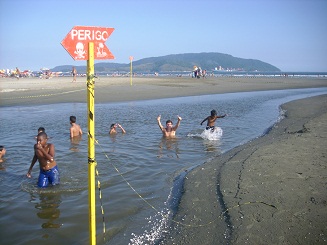
It takes a certain personality, a personality I certainly do not have, to photograph strangers. But this was too Brazilian to pass up. Just a hundred yards from an ocean, these guys preferred to swim in a drainage ditch. I imagined the photographees would be offended, but the two boys I initially found roistering directly under the monitory sign were quickly joined by the rest. I did not bother to repeat what I said to the first two, something about the skull and the upraised hand of someone evidently drowning. I was happy enough to remember the Portuguese for "skull" and it was just as well that I never knew the word for "party-pooper," though unquestionably there is one. The guy in the center kept calling, "Brasil! Brasil!" I called back, "Brasil! Enfrentando o perigo!"
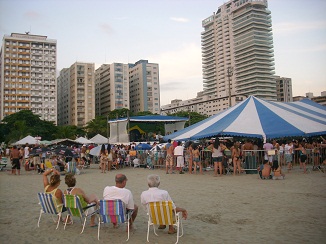
Carnaval, which is Brazil-wide and generally done this passive way. It actually requires some effort on my part to recall I have been in Brazil for several Carnavals - I barely noticed! (On the flight back from my visit to Pico da Neblina, in 1999, I and the one other passenger on the prop plane were told we'd get "VIP" treatment in the wake of Carnaval, and I believe we did. Certainly I did: the other guy got off at Tefé and I was the sole passenger into Manaus.) Anyway, here I was principally interested in the Brazilian flag, which looks like no other and like the flags of Texas and Alaska is flown a lot without ever being flown too much. It pleases me. As things prevailed this evening in Santos, no band was playing from that stage, but another was making representations from under the tent on the right. It seemed a little odd, these graying couples parking themselves directly in the awful blast. The music was really bad. But Carnaval is really just a fraternity party, where all you do is show up and there is no expectation that taste be evaluated or exercised. Also, and I had to concentrate before I detected this, the music was evangelical. "Deus/Tu és meu sol!" the vocalist sang, or rather yelled.
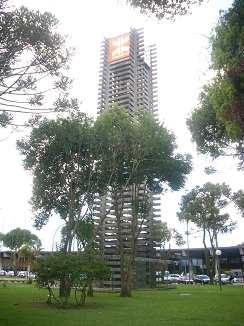
For a country that never went Communist, Brazil does a fair job of egesting ponderous public sculpture. But unlike Yugoslavia, which wrote the book, Brazil has not striven to communicate heroism in its piles. It just builds the stuff. What you make of it hardly matters. No guiding narrative is written on it, officially or folklorically. All this damned thing says is that you're at the combined bus/train terminal in Curitiba. And it won't ever say more because they put razor wire around the foot of it.
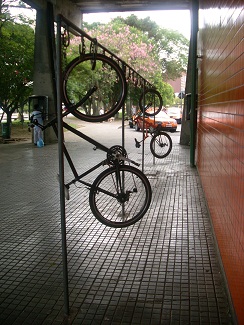
Also at the Curitiba station, this novel (to me) cleat for bicycles. I never would've thought to hang the things. But bike-rack building projects are like no other civic improvement. If Brazilians were governmentally compelled to sit a bicycle, the ratio of Brazilians who'd kill themselves or the bicycle in the act might be smaller than that of Americans equivalently enjoined, but it wouldn't be much smaller. Brazilians generally don't miss meals, and it shows. What they'd do if they not only rode the bicycle but then parked it is an absurdly remote contingency.
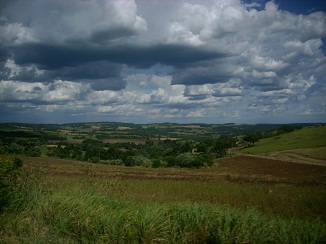
It's hard to photograph Brazil, because Brazil seldom looks very good. A snap from a speeding bus will have to do. This is about as wide-open prosperous, as tidily rich, as the country ever looks. Argentina does this so much better. Argentina not only looks richer, it has been richer longer. And yet Argentina has ever been the more unstable polity. In the Argentine newspaper I later bought, "government" was capitalized, wistfully I am sure.
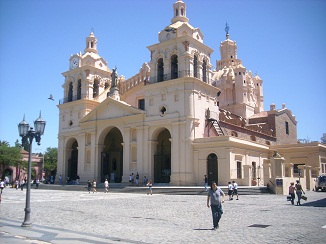
Spanish and Portuguese do not map, but it makes me feel smart to pretend they do. Thus on crossing from Foz do Iguaçu to Puerto Iguazú, I duly started a mental two-column list:
When I THINK...I should SAY:
- esquecer...olvidar
- cedo...temprano
- tesouras...tijeras
- fivela...hebilla
- orçamento...presupuesto
- enxame...enjambre
- outorgar...otorgar ('Cause if you get this one wrong, people think What are you, a foreigner?)
My time would've been better spent just photographing Puerto Iguazú, whose non-Brazilian-ness could be made evident without bad pedantry. For one thing, it was neat, as many Argentine things strive to be and few Brazilian things ever were. For another thing, the restaurant where I lunched was big on milanesas and devoid of guaraná. And for yet another thing, people seemed not to want to answer my questions about moneychanging. Where do you think you are, some Third-World country?
Well...yeah. Anyway, I did not linger in this border town, instead quickly boarding a bus for a 22-hour ride to the center of the country. Córdoba wasn't great to look at but it had antiquities in good repair, like this church, which dates from the late 1600's. Spain's record of nationbuilding is either the world's worst or tied with Russia's, yet it left lovely artifacts, touchstones of honest piety and bright arid grace that obviously hearken to the homeland. I doubt China's doing any of that in Tibet.
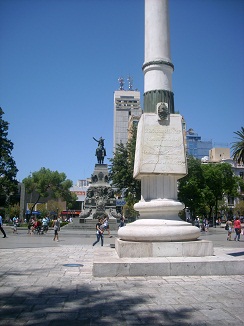
Not a joke at the time - at the time, I think, all people who spoke of freedom meant it as a fighting word, a don't-tread-on-me word, not a give-me-another-lollipop word. One of mature irritability. But in a world full of lollipops, one finds the ferocity hard to conjure, and so to me at least, this has become a joke. The maturity is surely gone, leaving only the irritability, which is therefore petulant, and anyone uttering such a war cry now has to be a bit cynical about it. The modern translation is tricky. It surely isn't "You Argentines must be Argentines - no one else wants the job!" Something much more sly, I think; something like "You Argentines must be Argentines - only you have got the, ah, skillset."
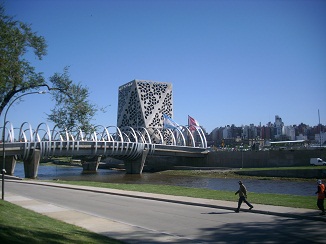
No idea at all how these things slipped in. I really thought Argentines would resist such civic tin. Maybe the whole concept is brand-new. After all, the bicentennial itself (of Argentine independence) was only in 2010. Since a bicentennial can happen only once, we may reasonably hope this is never seen again.
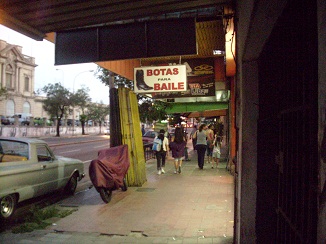
Get yer dancing boots on!
Seriously, I hope someone always does. I wish for many sharp argentinos to dance with equally many hot argentinas. Latin America hasn't discovered or invented much (vide infra) but it has conjured much, like tangos and whole cities. The riverbanks on which Buenos Aires and Montevideo are built are utterly featureless - yet the places were built anyway! The situation of Caracas sort of makes sense, just far in and up enough to avoid coastal pestilence, but São Paulo and Santiago (and Córdoba) went way past that. Why? Because nobody crosses an ocean just to collapse at the bottom of the gangplank. In their feet there remains much energy.
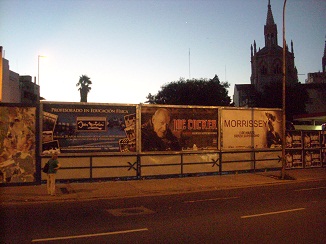
It's often like this in the Third World, which, as I say, is where Argentina still is. You can listen to a creaking old rock star, you can listen to a cranky semi-old semi-rock star, or you can study to become a gym teacher. At least you get a choice.
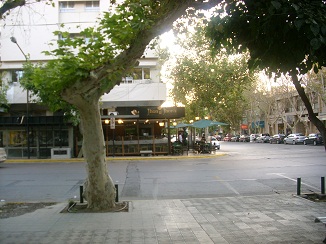
In case there was any lingering doubt about the constitutional inability of South Americans to spell "John" correctly. I do not know why these guys did not pick "Jonh" - that is equally honored south of the Panama Canal. Later, in Viña del Mar ordering a pizza, I would be given the opportunity to spell it my way, an opportunity at which I leaped, and though the girl at the counter maintained a poker face, certainly this was the first time she'd ever heard jota-o-ache-ene. Not quite so much later, the next day in fact, I would see in Mendoza keychains with Argentine-license-plate fobs, each showing a given name, and while "Jonathan" was represented, and correctly spelled, no variant of "John" was to be found.
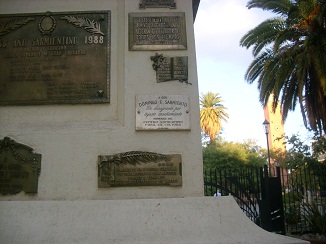
Nothing special about these encomiums to an educator, except the wording of the one in the center of my photo. "In partial compensation for unjust calumnies"? I do not know what vilification Mr. Sarmiento suffered in life or career (and the fact that he went into exile a few times reveals nothing, so common was the experience in Latin America), but someone was appalled by it and wanted badly to defend the man. Perhaps equally appalled Argentines pushed other Argentines out of helicopters over the Atlantic. I may be overstating a point but I think a point is nevertheless to be made: this country has a mean streak, perhaps numerous competing mean streaks.
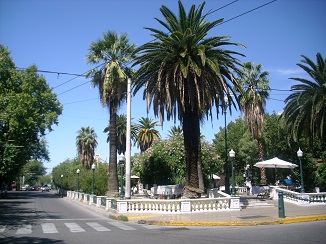
Just a little municipal refinement, the sort that Argentina is good at. Only a couple of blocks away from it, though, the scene was very different. Traffic in all directions was abruptly stopped; one cop on foot presided; then a couple on motorcycles blasted through, followed by still more. A woman asked me if this was a manifestación. Sure looked like one. Public servants venting? But no. In a few minutes we saw the reason for this: a bicycle race, right through downtown Mendoza. I knew a little about it, having skimmed the morning paper's sports section. Had I read it fully, I'd've anticipated this, though not been less disturbed by it. The woman looked as relieved as I felt.
For the scene felt ugly. The impatience of the stopped motorists, the furious horn-honking, and (much more ominous) the half-furtive sneakings-past. The delay's look was striking, not its length, which was just a few minutes. There is in Argentina, compared to what is in Brazil, something angrier. Argentina's dirty war had tens of thousands of admitted deaths; the contemporaneous troubles in Brazil, with more than quadruple the population, entailed deaths in the hundreds. And the mistrust of police, though large in Brazil, may be larger still in Argentina. I wonder if no Argentine likes or respects cops. I specifically wonder if the antipathy is twofold: either you dislike 'em and flatly wish 'em ill, or you dislike 'em and figure lots of your compatriots deserve 'em.
(Minor bonus observation: hardly any overhead wires. I do not recall what there was in Mendoza in 1988, but in Buenos Aires and Tucumán in 1986 I saw great tresses of phone lines, all over the place, seemingly connecting every single building with every other single building. In Buenos Aires, these might stretch across an 8-lane artery. Cell phones abruptly improved the Brazilian telecom industry and I suspect the effect in Argentina was at least as salutary.)
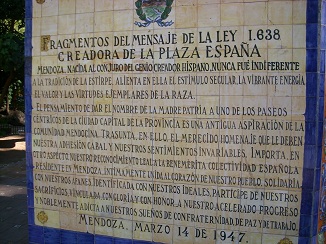
Besides looking forward to music that wouldn't make my teeth explode, I was also hopeful for no creepy references to La Raza. Argentina at least surprised me as it let me down. I am not sure whose law, Argentina's or Spain's, resulted in this emission. The "mother fatherland"? If Spain, well, maybe they were still a bit addled so soon after their civil war. If Argentina, well, I just don't see how anyone could come up with this in a place with so many Italians, Germans, Arabs, and Slavs.
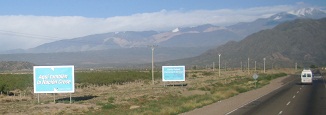
Saw these all around the country, but at highly irregular density. They were put up by the government, or Government. I imagined they indicated local representatives had brought home pork from Buenos Aires - and, conversely, that their absence meant the local representatives belonged to opposition parties - but I haven't actually read anything to confirm this view. I think the sign for the penitentiary is unrelated. These boasts appear unlinked to public works, and none showed anything like "Your Tax Pesos At Work."
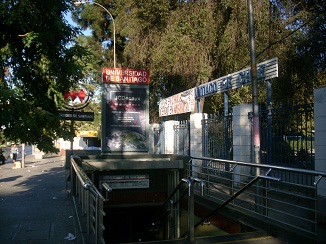
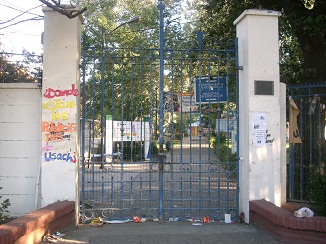
From something I read about Fidel Castro's activities at the University of Havana (can't remember what exactly, though I feel certain the word "homework" was nowhere in it), I got the idea that many Latin American universities are, from the police-jurisdiction standpoint, sovereign city-states. That when they're fenced, as USaCh is, the fence is a border, breached only by him willing to incur a hard political hit. Latin American U's actually come in all shapes and sizes - UNAM in Mexico City has almost a third of a million students, while the University of the Republic in Montevideo and the Federal University of Rondônia in Porto Velho were single small buildings when I saw them - but physically cordoned or not, they do all seem to get some outsized respect. Which is weird because it's been decades since anything has been discovered at a Latin American institution of higher learning. (I am thinking, and who among us is not, of Leloir's work, in Buenos Aires a half-century and more ago, with carbohydrates.)
But establishments like USaCh clunk ever onward. The adolescent self-abuse, the padlocked dinginess, the immortally lame sloganeering - it's all here. Who could be proud of a diploma from such a place? Y'know, I don't think anyone actually is. As silly as these institutions are, they don't seem to produce many lifelong crazies. Latin American colleges may in fact serve usefully as Get-It-Out-Of-Your-System-Lands.
Oh, by the way, USaCh is on the Avenida Libertador Bernardo O'Higgins, unanimously regarded by Latin-America connoisseurs as the Best Toponym Ever.
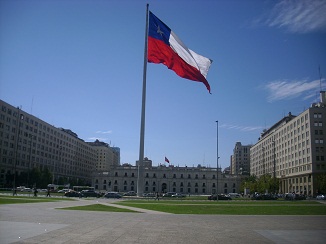
You may respond to the Palacio de la Moneda the way you may to the Alamo: it's smaller than I expected! The flag of Chile, very similar to the flag of Texas, may influence your reaction. I don't recall the big office buildings on either side being there in 1988, but even then, La Moneda looked little. Anyway, this time it seemed cheerier. Maybe a dictatorship doesn't always pall, but I always expect it to, and that amounts to about the same thing.
I saw this only because I'd got off the subway at the La Moneda station, figuring a post office would be nearby. One was, but it hadn't been easy to find. In the Santiago subway, there are maps of the whole system and the station environs...and the latter has north pointing down. I should have taken a picture of that. I should also have taken a picture, back in the bus station, of a certain company's list of destinations, because it wasn't in alphabetical order but in fare order. Chile is so.
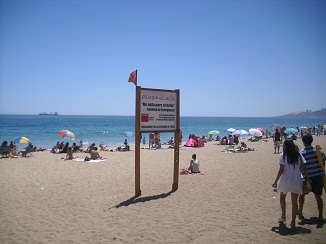
On the scant pictorial evidence, we'd say...not much at all about comparative beach-directive compliance in Brazil and Chile! Viña del Mar does have a canal running through it, but nobody was bathing therein when I looked. So, advantage Chile, perhaps?
I doubt a Brazilian would argue. Either way, I mean. It is in my experience rare for Brazilians who have traveled in other Latin American countries to rank them in any way - to say Brazil is better, or worse. (Even when pitted against Mexico, for crying out loud. If Mexico isn't a provocation and a punching bag both, what is?) I got the idea on this trip, around the time I was entering Argentina, that Latin Americans looked among themselves as if they'd all set up antique shops and of the competition could only snort, "Look at the junk they're selling!" Well, I don't believe now that they actually do that. (Also, in the only place I ever saw a great contiguity of antique shops - Menard, Texas, in June 2001, where I was seeking to buy a bicycle part, willing even to buy a whole junked bicycle just to scavenge the part - every such establishment was perfectly collegial.)
As for what Chileans might argue, I have no idea but fear the worst. Right by that canal in Viña del Mar, there is a Plaza México, with a monument to a certain diplomat from that nation who had won a Nobel Peace Prize. While I was studying it, a man hurtled in from a distance and loudly wondered, "What's the date on this?" There were four: the date of the prize, the diplomat's birth and death years, and the year the monument was erected. The man seemed unable to sort these out. His wife patiently read through it for him. Chileans seem to have a vocation for opaque thimble-theatre of this sort.